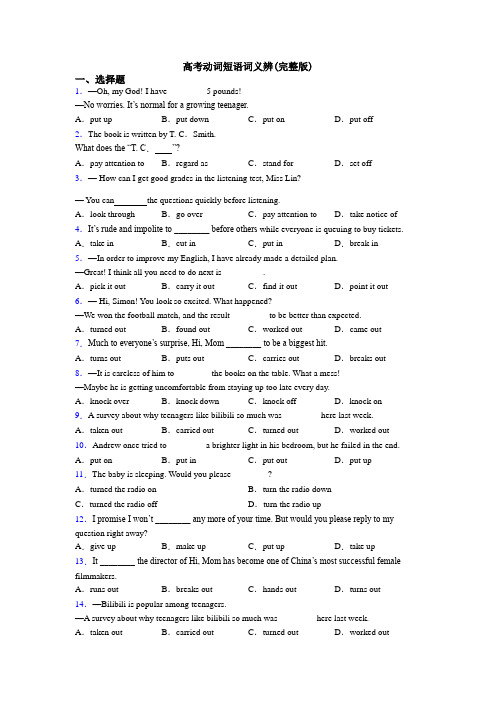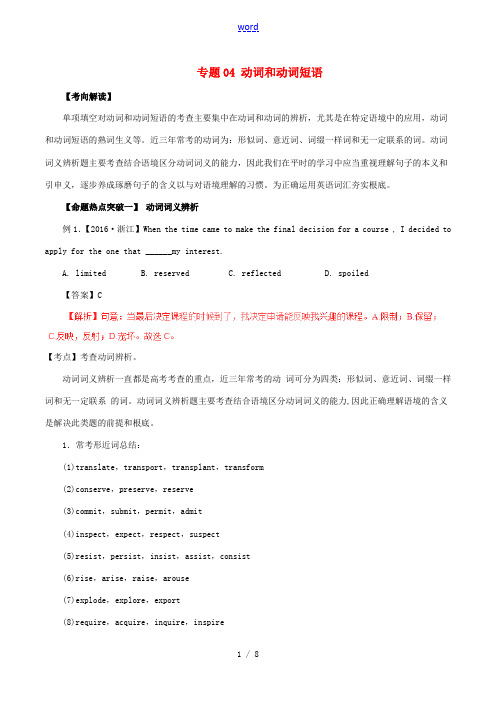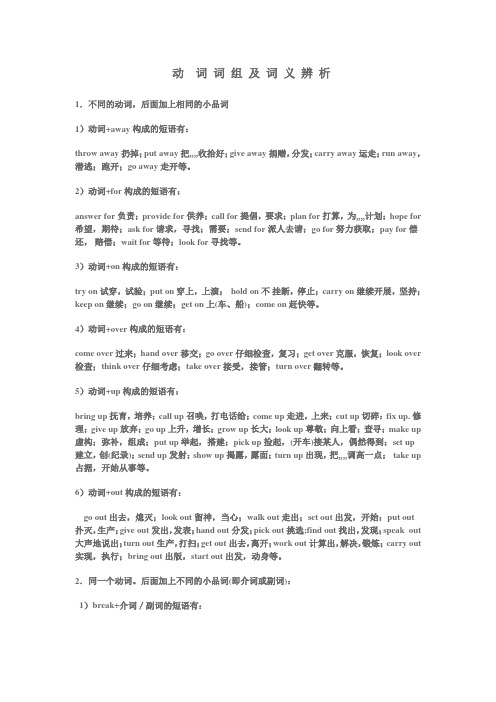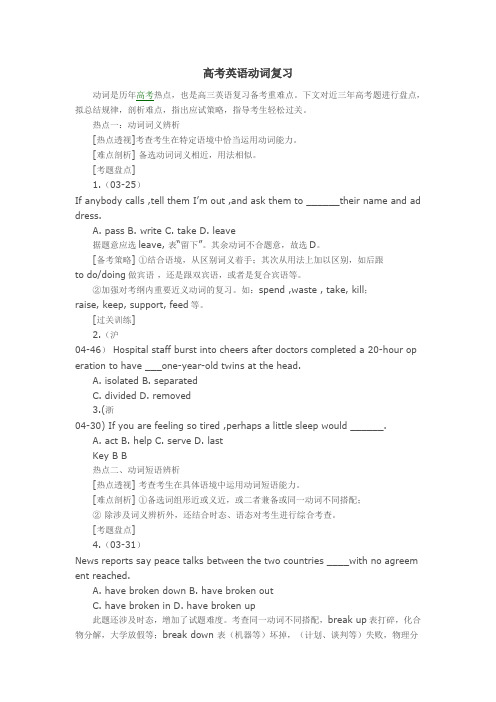高考英语动词词义辨析复习
高考动词短语词义辨(完整版)

高考动词短语词义辨(完整版)一、选择题1.—Oh, my God! I have ________ 5 pounds!—No worries. It’s normal for a growing teenager.A.put up B.put down C.put on D.put off 2.The book is written by T. C.Smith.What does the “T. C.”?A.pay attention to B.regard as C.stand for D.set off 3.— How can I get good grades in the listening test, Miss Lin?— You can the questions quickly before listening.A.look through B.go over C.pay attention to D.take notice of 4.It’s rude and impolite to ________ before others while everyone is queuing to buy tickets. A.take in B.cut in C.put in D.break in 5.—In order to improve my English, I have already made a detailed plan.—Great! I think all you need to do next is _________.A.pick it out B.carry it out C.find it out D.point it out 6.— Hi, Simon! You look so excited. What happened?—We won the football match, and the result ________ to be better than expected. A.turned out B.found out C.worked out D.came out 7.Much to everyone’s surprise, Hi, Mom ________ to be a biggest hit.A.turns out B.puts out C.carries out D.breaks out 8.—It is careless of him to________ the books on the table. What a mess!—Maybe he is getting uncomfortable from staying up too late every day.A.knock over B.knock down C.knock off D.knock on 9.A survey about why teenagers like bilibili so much was ________ here last week. A.taken out B.carried out C.turned out D.worked out 10.Andrew once tried to ________ a brighter light in his bedroom, but he failed in the end. A.put on B.put in C.put out D.put up 11.The baby is sleeping. Would you please ________?A.turned the radio on B.turn the radio downC.turned the radio off D.turn the radio up12.I promise I won’t ________ any more of your time. But would you please reply to my question right away?A.give up B.make up C.put up D.take up13.It ________ the director of Hi, Mom has become one of China’s most successful female filmmakers.A.runs out B.breaks out C.hands out D.turns out 14.—Bilibili is popular among teenagers.—A survey about why teenagers like bilibili so much was ________ here last week. A.taken out B.carried out C.turned out D.worked out15.—Who’s going to ________ the children while you are away?—Don’t worry. My mum will come.A.look at B.look around C.look after D.look like 16.Scientists need to ________ several surveys before making a conclusion.A.give up B.carry out C.hear of D.look for17.We are supposed to ________ smart phones and take more exercise instead.A.put up B.put away C.put on D.put out 18.—What time does the first train to Beijing leave?—Wait a minute. I am just ________ the train times.A.taking up B.picking up C.making up D.looking up 19.I’ve had some difficulties, but they were nothing compared _____ yours.A.to B.of C.for D.from 20.—What happened, Martin?—Last night, someone ________ my house and stole many valuable things.A.broke into B.broke down C.turned into D.turned down 21.All of us had a good time during this year’s May Day holiday because we ________ five days________ .A.had...off B.took...off C.put...off D.turned...off 22.—All right, I’ll take it. But I tell you, it is the last time I will _________ this kind of work —Come on, Buddy! Don’t be so serious.A.take off B.take out C.take on D.take up 23.Would you please ____________ the light? I can't sleep well with it on.A.turn on B.turn off C.turn to D.turn around 24.You’d better________all the questions before having the test.A.look after B.look at C.look out D.look through 25.Make sure that you have prepared everything well before you ________ the plan.A.carry out B.break out C.turn out D.put out 26.—Excuse me, does Mr. Smith’s son live here?— He ________ be here. But now he ________ in the city.A.used to; is used to live B.was used to; is used to livingC.used to; is used to living D.is used to; used to live27.— Excuse me, which is the way to Kaiming Middle School?—________ this street, and you’ll find it on your right.A.Write down B.Go down C.Lie down D.Sit down28.As a volunteer, he often goes to the hospital to ________ the sick.A.cheer for B.help for C.put up D.cheer up29.Life is full of ups and downs. When your friends are unhappy, tell them something funny and encourage them to ________.A.put up B.cheer up C.stay up D.give up 30.Children’s Day is on the way. Many shops have ________ huge posters with the word“SALE”.A.put on B.put in C.put away D.put up31.Bob is busy taking the desks and chairs away because they ___________ too much room in the hall.A.pick up B.take up C.put up D.cheer up 32.Daniel, stop playing computer games, please! It has ________ your free time too much. A.turned up B.picked up C.put up D.taken up 33.What a pity! The weather ________ to be rainy. We had to cancel the sports meeting. A.ran out B.broke out C.found out D.turned out34.V olunteers ________ leaflets to encourage more people to separate rubbish correctly. A.put out B.find out C.hand out D.turn out 35.Based on local cultures and museums, schools should develop local courses ________ art, history, geography, and biology.A.led to B.taken on C.chosen from D.connected with 36.—The Civil Code (民法典) ________ to be a big success and it is a milestone in our country legal science.—I can’t agree more.A.turns out B.puts out C.takes out D.breaks out 37.—Excuse me, sir, but smoking is not allowed in hospital.—Sorry, I didn’t see the sign. I’ll _______ my cigarette.A.put in B.put up C.put out D.put on38.A society cannot be successful if it ________ tradition, but it cannot be successful either if we do something to stop progress.A.takes away B.throws away C.gets away D.puts away 39.The workers ________ a sign to warn people of the danger here.A.put out B.put in C.put up D.put on40.My brother often _________ his spare time to help me with my spoken English.A.puts up B.gives up C.opens up D.tidies up【参考答案】一、选择题1.C解析:C【详解】句意:——哦,我的天哪!我增重了五磅!——别担心。
高考英语(考点解读命题热点突破)专题04 动词和动词短语-人教版高三全册英语试题

专题04 动词和动词短语【考向解读】单项填空对动词和动词短语的考查主要集中在动词和动词的辨析,尤其是在特定语境中的应用,动词和动词短语的熟词生义等。
近三年常考的动词为:形似词、意近词、词缀一样词和无一定联系的词。
动词词义辨析题主要考查结合语境区分动词词义的能力,因此我们在平时的学习中应当重视理解句子的本义和引申义,逐步养成琢磨句子的含义以与对语境理解的习惯。
为正确运用英语词汇夯实根底。
【命题热点突破一】动词词义辨析例1.【2016·浙江】When the time came to make the final decision for a course , I decided to apply for the one that ______my interest.A. limitedB. reservedC. reflectedD. spoiled【答案】C【考点】考查动词辨析。
动词词义辨析一直都是高考考查的重点,近三年常考的动词可分为四类:形似词、意近词、词缀一样词和无一定联系的词。
动词词义辨析题主要考查结合语境区分动词词义的能力,因此正确理解语境的含义是解决此类题的前提和根底。
1.常考形近词总结:(1)translate,transport,transplant,transform(2)conserve,preserve,reserve(3)commit,submit,permit,admit(4)inspect,expect,respect,suspect(5)resist,persist,insist,assist,consist(6)rise,arise,raise,arouse(7)explode,explore,export(8)require,acquire,inquire,inspire(9)contribute,distribute(10)aboard,abroad,board2.常考意近词总结:(1)win,defeat,beat,gain(2)fit,suit,match(3)cost,spend,take,pay(4)affect,effect,influence(5)announce,declare(6)adapt,adjust【变式探究】 By applying the theory to the problem,we can brush away the detailsto________simple patterns.A.release B.rejectC.reveal D.replace答案:C【方法技巧】解答特定语境下考查动词意义的辨析题对于特定语境下考查动词意义辨析的题目而言,一般来说,没有巧妙的解题技巧,解题步骤通常是首先判断题干的具体含义,接着确定选项的意义,然后结合二者选出答案。
动词词组及词义辨析

动词词组及词义辨析1.不同的动词,后面加上相同的小品词1)动词+away构成的短语有:throw away扔掉;put away把……收拾好;give away捐赠,分发;carry away运走;run away,潜逃;跑开;go away走开等。
2)动词+for构成的短语有:answer for负责;provide for供养;call for提倡,要求;plan for打算,为……计划;hope for 希望,期待;ask for请求,寻找;需要;send for派人去请;go for努力获取;pay for偿还,赔偿;wait for等待;look for寻找等。
3)动词+on构成的短语有:try on试穿,试验;put on穿上,上演;hold on不挂断,停止;carry on继续开展,坚持;keep on继续;go on继续;get on上(车、船);come on赶快等。
4)动词+over构成的短语有:come over过来;hand over移交;go over仔细检查,复习;get over克服,恢复;look over 检查;think over仔细考虑;take over接受,接管;turn over翻转等。
5)动词+up构成的短语有:bring up抚育,培养;call up召唤,打电话给;come up走进,上来;cut up切碎:fix up. 修理;give up放弃;go up上升,增长;grow up长大;look up尊敬;向上看;查寻;make up 虚构;弥补,组成;put up举起,搭建;pick up捡起,(开车)接某人,偶然得到;set up建立,创(纪录);send up发射;show up揭露,露面;turn up出现,把……调高一点;take up 占据,开始从事等。
6)动词+out构成的短语有:go out出去,熄灭;look out留神,当心;walk out走出;set out出发,开始:put out扑灭,生产;give out发出,发表;hand out分发;pick out挑选;find out找出,发现;speak out 大声地说出;turn out生产,打扫;get out出去,离开;work out计算出,解决,锻炼; carry out 实现,执行;bring out出版,start out出发,动身等。
高考复习动词和动词短语

A your cell phone when 8. Terry, please _____ Grandma is talking to you. (安徽2014) A. look up from B. look into C. look back on D. look through 9. Shakespeare’s writing is still popular B the test of today. It has really _____ time. (安徽2014) A. failed B. stood C. taken D. conducted
2. 动词短语辨析。主要包括同根动词短语 的辨析、同根介词或副词的动词短语的 辨析、 不同动词构成的动词短语的辨析 以及“动词+副词+介词”短语的辨析。 在动词词组的测试中,绝大多数为基础 动词,出现频率较高的词有:get, turn, make, put, go, give, break, cut, come, look, keep, bring, show, pick, hold, fall, carry, pull, catch, call, take等。
4. As a grassroots singer, she reads everything she can _____ B concerning music, and takes every opportunity to improve herself. (福建2014) A. catch sight of B. get hold of C. take charge of D. make mention of
Ralph W. Emerson would always _____ D new ideas that occurred to him. (陕西2014) A. set off B. set about C. set up D. set down
高考英语动词复习

高考英语动词复习动词是历年高考热点,也是高三英语复习备考重难点。
下文对近三年高考题进行盘点,拟总结规律,剖析难点,指出应试策略,指导考生轻松过关。
热点一:动词词义辨析[热点透视]考查考生在特定语境中恰当运用动词能力。
[难点剖析] 备选动词词义相近,用法相似。
[考题盘点]1.(03-25)If anybody calls ,tell them I’m out ,and ask them to ______their name and ad dress.A. passB. writeC. takeD. leave据题意应选leave, 表“留下”。
其余动词不合题意,故选D。
[备考策略] ①结合语境,从区别词义着手;其次从用法上加以区别,如后跟to do/doing做宾语,还是跟双宾语,或者是复合宾语等。
②加强对考纲内重要近义动词的复习。
如:spend ,waste , take, kill;raise, keep, support, feed等。
[过关训练]2.(沪04-46) Hospital staff burst into cheers after doctors completed a 20-hour op eration to have ___one-year-old twins at the head.A. isolatedB. separatedC. dividedD. removed3.(浙04-30) If you are feeling so tired ,perhaps a little sleep would ______.A. actB. helpC. serveD. lastKey B B热点二、动词短语辨析[热点透视] 考查考生在具体语境中运用动词短语能力。
[难点剖析] ①备选词组形近或义近,或二者兼备或同一动词不同搭配;②除涉及词义辨析外,还结合时态、语态对考生进行综合考查。
备战2023年高考英语考点一遍过考点07动词和动词短语含解析

考点07 动词和动词短语高考频度:★★★★★英语动词根据其意义和句法作用,可分为实义动词、连系动词、助动词和情态动词四大类。
实义动词又称行为动词,为表示动作或状态的动词,可以单独充当句子的谓语,实义动词有及物动词和不及物动词两类。
英语中的动词短语通常由动词加介词、副词、名词等构成,在句中起动词的作用。
高考设题时往往都是给出四个不同的动词或短语来测试考生在具体语境中对动词短语词意的辨析及其理解和运用能力。
考向一常用动词辨析1.advise,persuade,suggestadvise用作及物动词,表示"劝告,忠告,建议",强调提醒或引起注意;persuade表示"说服",强调劝说成功,主要搭配是:persuade sb.to do sth.说服某人做某事(相当于persuade sb. into doing sth.);如表示劝说但不一定成功,则使用try to persuade sb.to do sth.或advise sb.to do sth.。
suggest用作及物动词,意为"建议",后接名词、代词、动名词或从句,从句中的谓语用"should+动词原形",should可以省略。
2.bring,take,carry,fetchbring"带来,拿来,取来",强调从别处带人或物到说话人所在地。
take"拿走,带走",强调把人或物从说话者身边带走,方向与bring相反。
fetch"去拿来,去取来",强调从甲地出发到乙地取物或人后,又回到甲地,相当于go and bring。
carry"携带,搬运,运送",强调用人力或车辆把人或物从一地运到另一地。
3.win,beat,defeatwin表示"赢得,战胜"时,宾语多是比赛项目等。
win sb.则指"赢得人心"。
beat/defeat意为"打败,击败",其宾语只能是人或由人组成的机构。
如:beat sb.打败某人;defeat their team/ the country/the enemy击败了他们的队/国家/敌人。
高三英语一轮语法:第05讲动词和动词短语

第五讲动词和动词短语考点一动词词义辨析1.(2013·**高考)While intelligent people can often ______ the ple*, a fool is more likely to plicate the simple.A.sacrifice B.substituteC.simplify D.survive解析:选C 考察动词辨析。
句意:聪明的人常常能把复杂的事情简单化,而愚蠢的人更可能把简单的问题复杂化。
根据句意可知,这里用simplify与后面的the simple对应,the ple*与后面的plicate照应。
sacrifice"牺牲〞;substitute"代替〞;survive"幸存〞。
2.(2013·新课标卷Ⅰ)Try not to cough more than you can ________ since it may cause problems to your lungs.A.check B.allowC.stop D.help解析:选D 考察动词辨析。
句意:尽量不要过多咳嗽,因为咳嗽过多可能引发你的肺部问题。
not more than one can help意为"能少尽量少〞,符合句意。
3.(2013·**高考)A good listener takes part in the conversation, ________ ideas and raising questions to keep the talk flowing.A.realizing B.copyingC.offering D.misunderstanding解析:选C 考察动词辨析。
句意:善于倾听的人在谈话的时候,往往会提出想法和问题,从而使得谈话能流畅地进展下去。
offer"提供,主动提出〞,符合句意。
新高考英语真题分项汇编专题:动词和动词短语(解析版)

专题04 动词和动词短语1.(2023年新高考I卷完形填空)As reported by a local newspaper, Bailey was more than two-thirds of the way through her race when a runner in front of her began crying in pain. She ____25____ to help her fellow runner, Danielle Lenoue.25. A. agreed B. returned C. stopped D. promised【答案】C【25题详解】考查动词词义辨析。
句意:她停下来帮助她的同伴Danielle Lenoue。
A. agreed同意;B. returned回来;C. stopped 停止;D. promised答应。
根据下文“to help her fellow runner”可知,她停下来帮助她的同伴Danielle Lenoue。
故选C。
2.(2023年新高考II卷)As a little girl, I ________ (wish) to be a zookeeper when I grew up. Now, I’m living out that dream indirectly by helping the panda keepers do their job in English.【答案】wished【详解】考查动词。
句意:作为一个小女孩,我希望长大后成为一名动物园管理员。
分析句子结构可知,本句缺少谓语动词,所以wish作本句谓语,和主语I之间是主动关系,根据后文的grew可知用一般过去时。
故填wished。
3.(新高考II卷完形填空)It just ___44___ that I was planning another PNP flight with another pilot, Karen, who ___45___ to take Tiffy from Kansas City to Virginia. What I was to do was fly to Topeka to ___46___ Tiffy.44. A. appeared B. proved C. happened D. showed45. A. waited B. offered C. hurried D. failed46. A. see off B. look for C. hand over D. pick up【答案】44. C 45. B 46. D【详解】【44题详解】考查动词词义辨析。
- 1、下载文档前请自行甄别文档内容的完整性,平台不提供额外的编辑、内容补充、找答案等附加服务。
- 2、"仅部分预览"的文档,不可在线预览部分如存在完整性等问题,可反馈申请退款(可完整预览的文档不适用该条件!)。
- 3、如文档侵犯您的权益,请联系客服反馈,我们会尽快为您处理(人工客服工作时间:9:00-18:30)。
高考英语语法复习动词词义辨析动词是是各类考试的重点,高考试题中,单项填空、完形填空和改错等三项题型中,动词辨义的比重较大,并逐年增加。
动词辨义主要指:1、形状相同的动词之间辨义。
如:lie, lay; hanged, hung; rise, raise; sit, seat等。
2、意义相近的动词之间辨义。
如:borrow, lend; speak, say, talk; hope, wish等。
3、动词与其它词形相近、意义相似的词的辨义。
如:advise, advice; cost, worth; pass, past 等。
4、意义不同,但容易混淆的动词的辨义。
如:explain, say; discover, invent, uncover; find, find out等。
5、某些常用动词的习惯用法的辨义。
如:ask, give, call, make, find, get, keep, want, see, hear等。
6、某些常用动词短语的辨义。
如:give in, give up, turn on, turn off, turn down, turn up等。
(一)易混动词2、rise和raise:rise是不及物动词,其过去式是rose,过去分词是risen,而raise 是及物动词,是规则动词。
3、hear与listen to:hear侧重点是听到,听见什么,而listen to是侧重于听的倾向,但hear用于无意中的听见,而listen to却用于集中注意力的听。
4、see, watch和look:see用作看电影,剧目;watch则用作看电视比赛,而watch还有在旁观看之意。
如:Are you going to play or only watch?;look一般用作不及物动词,只是当盯着某人看时用作及物动词,如:The little boy looked me in the face.(小男孩直盯着我的脸。
)5、wind和wound:wind意为蜿蜒而行,其过去式与过去分词都是wound,而动词原形wound 意为伤害,其过去式、过去分词都是wounded。
6、hang的用法:hang有两个意思:一为悬挂,是不规则动词,过去式、过去分词都是hung;二为绞刑,是规则动词,其过去式、过去分词都是hanged。
7、hear的过去分词born与borne:bear作为出生讲有两个过去分词born,borne。
只有当be+born…短语后没有by介词短语时,才可用born。
如:He was born in Shanghai. 而作它用时要用borne。
如:She has borne five children. 但如果作忍受讲,则一律用borne。
8、sit与seat:seat为及物动词时是作容纳讲,sit只是表示一动作。
seat如果表示就座时要用be seated。
如:They were seated at their desks. 或用seat oneself, 比如:I seated myself in the armchair.9、borrow, lend与keep:借入英文中用borrow,借出用lend,但这两个词都是截止性动词或瞬间动词,不能用于长时间的动作,所以我能借多久应用keep。
10、win与beat:win作胜、赢讲时其后应接,a game, an argument, a battle, a prize,a contest, a race, a bet,但不能接人,如果接人则有另外的含意。
如:I have won him. 即我已说服他了,我赢得他的好感。
而beat是及物动词为击败、胜过讲,直接接人、队。
11、steal与rob:steal为偷。
rob为抢,其用法不同。
steal其后接物+from+某人、某地,而rob其后接人+of+抢的物品。
12、fit与suit:fit与suit均可作合适讲,但英文中却用在不同的地方。
如fit用于尺寸大小的合适,而suit则多用于颜色式样的合适。
13、take, bring 与fetch:英文中拿三个词,即拿来,拿去,去取然后回来(即双程)。
所以拿来,带来是bring,拿去带走是take,而去取回来是fetch。
14、shut与close:shut与close有时是可以互换的,但有些地方则不可这样做。
如:在正式场合多用close,而在命令,态度粗暴的场合则用shut。
如:Shut your mouth!(闭嘴);又如:Shut up. 在指铁路、公路交通关闭或停止使用的场合,则要用close。
15、answer与reply:作为回答讲answer是及物动词,如作不及物动词,则意义不同,如answer for,意为向某人或向某事负责。
而reply作回答讲是不及物动词,后跟宾语时,要加上to。
16、reach,arrive与get to:reach当到达讲是及物动词,而当延伸和拿得到、拿不到时讲,则是不及物动词。
作到达讲时还有get to, arrive(at/in)。
17、cost,spend与take:英文中花费有三个词cost, spend, take,但各有不同用法。
cost作“花费”讲,主语不能是人,而spend的主语不能是物。
如: she spent all his money on stamps.而take作花费讲时,可用人也可用物做主语。
更多的用法是用形式主语it,如It takes me three hours to finish this work.18、lost, gone与missing:作补足语时意为丢失、不见了,可以用lost, gone,但要用miss时则不能用missed, 而要用missing.19、have on, wear, put on及dress:作穿衣服讲的动词分为状态和动作两种。
have on 与wear作穿着状态讲;但have on不用进行时态,而wear则常要用进行时态。
put on是动作,但dress既可用作状态,又可用作穿衣动作,但用作状态时要用其过去分词作形容词如:He was dressed in a b1ue suit作动作讲时,其后不要接衣物而要接反身代词或表示人、物的名词,如:I dress my children in the morning every day.20、begin与startbegin与Start 均可作开始讲,并无多少区别,同样可接不定式或动名词,但在下面的场合多要用Start:1)机器的开动发动;2)旅途的开始。
如:we shou1d have to start early because there was a lot traffic in the street。
21、allow 与permitallow与permit其后直接接动作时要用动名词,如接人后再接动词则要用不定式,所以用在被动语态时一定要用不定式。
如:People are not allowed to spit.22、find与foundfind找到的过去式和过去分词都是found,而found是动词“建立”的原形,其过去式和过去分词是founded,founded,如:The People’s Republic of China was founded in 1949.23、speak, say, talk 与tell英文中讲有4个词,speak, say, talk, tell,但其中speak, talk多用作不及物动词,但speak后加语言名词时则用作及物动词,如:Please speak English。
而say与tell是及物动词,其中tell常用作接双宾语,如:Tell me a story。
但也有些特定的习惯用法,如:在作讲实话,讲谎言,表示时间常用单宾语而不能换其它词,如:My watch was broken. It couldn’t tell time correctly。
在书信、便条、海报上写着英文应为It said …。
在作辨别不同讲时是tell,如:Can you tell me the difference between the two?而讲别人好坏话时用speak,如:The father always speaks well of his son.。
24、excuse me 与sorryexcuse me用于来打拢对方前以提醒对方注意的提示语,而sorry则表达因作了某事向对方道歉。
25、care for 与care to docare for其后要接不定式时则要省去for或换用名词,如:Would you care for a cup of tea?但care for作照顾讲时与look after相同。
26、与名词易混的动词有:advise(v.), advice (n.); accept(v.), except(prep.); pass(v.), past(prep.); bathe(v.), bath(n.); breathe(v.), breath(n.); choose(v.), choice(n.); succeed(v.), success(n.);27、意义相近的动词:ring摇铃,打铃,电话铃响,strike专指敲钟,打几点,撞击;suggest提出实验性或推测性的建议,advice表示对经验不足人的一种忠告;look由视觉得出的印象,seem暗示一定根据的判定,appear外表印象而实际或结果并非如此;stay停留,逗留,remain 遗物,某物被取走一部分后剩余部分;discover(发现)找到早已存在但未被人所了解的东西,invent(发明)研制出不存在的东西;remember记忆起以前经历或知道的事,remind提醒某人做某事。
28、动词 + 副词 + 介词:catch up with, look forward to, come up with, keep up with, go in for, look down on, get on with …29、动词 + 介词to的词组有:come to, stick to, object to, agree to, turn to, attend to, belong to, devote to, reply to …30、与in相结合的动词有:give in, hand in, bring in, drop in, succeed in, take in, check in, engage in, fill in, trade in …(二)动词短语动词短语是指动词和介词、副词或名词的习惯搭配。
